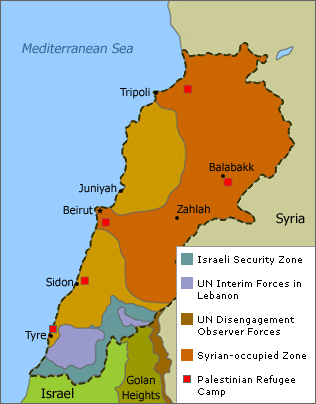The Ta’if Agreement of 1989, which led to the end of Lebanon’s civil war in 1990, sought to level the balance of power shared between the country’s Maronite Christian minority and the Muslim majority. It reduced the power of the president and expanded the Chamber of Deputies to 128 seats, dividing them equally between Christians and Muslims (counting the Druze as Muslims). Although the agreement reasserted Lebanon’s independence and unity, it also legitimized the presence of Syria’s military within Lebanon, leaving the issue of how Lebanon would obtain complete sovereignty open for discussion. Syria had as many as 16,000 troops stationed across Lebanon — in addition to the armed, Syria-backed Hezbollah militia, which remained intact at the end of the war when other militias were dissolved.
Israel, meanwhile, retained control over a self-declared “security zone” in the south as a way of preventing Palestinian cross-border attacks. In May 2001, though, Israel withdrew all its remaining forces. Three and a half years later, the U.N. Security Council passed Resolution 1559, which called for the withdrawal of all remaining foreign forces from Lebanon — as well as the disarmament of all Lebanese and non-Lebanese militias. The resolution was clearly aimed at Syria and Hezbollah. Syrian Foreign Minister, Faruq al-Sharah, called the resolution an illegal intervention in the relationship between Syria and Lebanon. But in February 2005, after the assassination of anti-Syrian, former prime minister, Rafiq Hariri, public sentiment turned against Syria. Massive rallies called for the end of occupation and, in April, Syria withdrew all of its military forces — although many suspected Syrian agents remained in Lebanon. Then, in the weeks leading up to and following Lebanon’s June 2005 parliamentary elections, a number of car bombings cast a shadow over hopes for the flourishing of a stable, new Lebanese independence. Many felt Syria was behind the assassination of anti-Syrian journalist Samir Kassir and leftist politician George Hawi. For now, Hezbollah remains an officially recognized and influential political party, having won all southern Lebanon’s available seats in the June elections.
- Previous: Civil War



